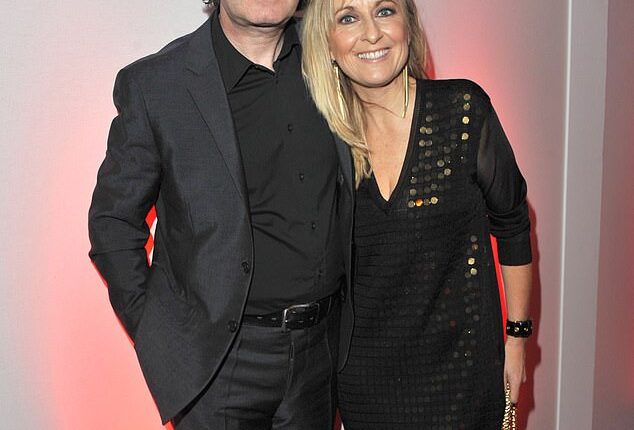Fiona Phillips has not cooked in years and has no time for her dressing room of designer clothes as she battles Alzheimer’s, her husband Martin Frizell has revealed.
The former GMTV host, 64, was diagnosed with the brain disorder in 2022, aged just 61.
It came after she left the former ITV breakfast show in 2008 to care for her father, who suffered from it too, dying in 2012, after her mother lost her life to it as well, in 2006.
Her husband and former editor of This Morning Mr Frizell, 66, left the ITV chat show after ten years in February to care for Ms Phillips.
She has now written a memoir, Remember When: My Life With Alzheimer’s, with the help of her husband and journalist friend Alison Phillips, about her diagnosis.
Ahead of its release on July 17, her husband has now spoken out about some of the most heartbreaking impacts of the disease.
Mr Frizell said all her favourite hobbies and interests are now gone – she has not cooked in two years and wears the same T-shirt and trousers every day.
He asked The Telegraph: ‘What do I do with all these clothes?’

Fiona Phillips has not cooked in years and has no time for her dressing room of designer clothes as she battles Alzheimer’s , her husband Martin Frizell has revealed. Pictured: The couple in 2010

The former GMTV host (pictured in 2019), 64, was diagnosed with the brain disorder in 2022, aged just 61

It came after she left the former ITV breakfast show in 2008 to care for her father, who suffered from it too, dying in 2012, after her mother lost her life to it as well, in 2006
And of her previously beloved cookery books, which now lay piled in the basement: ‘Do I take them to the dump?… She’s never going to open one again.’
Alzheimer’s disease is the most common cause of dementia, an umbrella term for symptoms associated with ongoing brain function decline.
It is a progressive condition, meaning symptoms and their severity develop gradually over years, affecting memory, thinking skills and other mental functions.
There is currently no cure but there are medicines which can somewhat alleviate symptoms.
In the UK, more than 70,000 people live with early-onset dementia and nearly a million live with dementia more broadly.
Mr Frizell, who married Ms Phillips in 1997 and shares two children, Nathaniel, 26, and Mackenzie, 23, with her, started by contributing a few paragraphs to his wife’s memoir.
But he ended up generating more than 24,000 words as his anger about the lack of support for those with Alzheimer’s and research about the disease.
He recalled when she was diagnosed and given a leaflet on living with the disease that had a old couple with a Zimmer frame on it.

Mr Frizell said all her favourite hobbies and interests are now gone – she has not cooked in two years and wears the same T-shirt and trousers every day. Pictured: The couple in 2005

He asked: ‘What do I do with all these clothes?’. Pictured: Fiona and Martin on GMTV
It completely jarred with how young she was, having only just turned 61, Mr Frizell said: ‘She was wearing skinny jeans and high-heeled boots.
‘This was a degenerative disease for old people like the ones on the leaflet.’
The couple first put her symptoms – brain fog, social withdrawal, mood swings, depression and anxiety – down to the menopause.
But the change in Ms Phillips – previously always the life and soul of the party – was so stark, Mr Frizell knew at heart there had to be something more at play.
Despite her family history of Alzheimer’s, Ms Phillips’ diagnosis is not genetic so cannot be passed to her sons – a relieving result of tests they had to wait an agonising two weeks for.
She is instead ‘predisposed’ to it, a more common means of developing Alzheimer’s than directly inheriting it.
Factors that increase someone’s predisposition to the disease include family history, the presence of certain genes and other health problems like diabetes, heart issues and high blood pressure.
His wife has always been active – so Mr Frizell wondered if her diagnosis could have been caused by stress.

Her diagnosis completely jarred with how young she was, having only just turned 61, Mr Frizell said: ‘She was wearing skinny jeans and high-heeled boots’. Pictured: The couple in 2013

The couple (pictured in 2001) first put her symptoms – brain fog, social withdrawal, mood swings, depression and anxiety – down to the menopause
At one point, during her turn on GMTV from 1993 to 2008, she was starting work at 3am, taking part in Strictly Come Dancing, bringing up her young sons, and caring for her parents, who lived far away in Wales.
But he also thought it could be their lifestyle in their younger years – which saw them regularly drink a bottle of wine each every night.
Mr Frizell said he feels guilty about this – as well as for taking his wife’s place promoting the book, done only out of necessity as she is not well enough.
He also feels bad about sometimes speaking about her in past tense – but the heartbreaking thing about dementia is it has seen her already gradually start to fade away.
The pair met as roving reporters on GMTV, with Mr Frizell proposing after just four weeks.
It was her genuine kindness, in the cut-throat world of reporting, that caught his eye – and the pair soon wed in Vegas.
Mr Frizell, who has also edited GMTV and Loose Women, now cares for Ms Phillips full-time from their home in the Wandsworth area of south London.
With needed breaks for podcasting and sailing and the help of his sons, he gets by.

The pair (pictured in 2016) met as roving reporters on GMTV, with Mr Frizell proposing after just four weeks

Mr Frizell (pictured leaving This Morning in February this year) insisted they are coping currently without professional help, with Fiona still having periods of being present, lucid and herself
They briefly found a drug which stabilised her condition – albeit requiring him to inject her stomach three times per day – but its effects only lasted a year.
She has now declined considerably over the last 12 months, needing help with basic tasks like brushing her teeth, developing more confusion, pain, delirium and psychosis and mostly staying inside
It is hard sometimes, he says, to remain patient and calm when forced to repeat himself to her over and over again.
‘I’m not going to be the Mother Teresa of Wandsworth’, he said.
But he insisted they are coping currently without professional help, with Fiona still having periods of being present, lucid and herself.
She still, for instance, makes perceptive comments, or recalls lyrics from an old song, or remembers to water the plants.
Her diagnosis has affected their shared life as a couple though, with many friends no longer inviting them out – and, on one occasion, actively moving tables at a cafe to avoid them.
They are perhaps scared by the change in her, by their own mortality or by simply not knowing what to say, Mr Frizell ventured.

Her diagnosis has affected their shared life as a couple, with many friends no longer inviting them out

The couple (pictured at Derek Draper’s funeral last year) have never once discussed her having Alzheimer’s explicitly since she was diagnosed – she knows the way it is going and it is too upsetting to be reminded
The couple have never once discussed her having Alzheimer’s explicitly since she was diagnosed – she knows the way it is going and it is too upsetting to be reminded.
Its progress feels unstoppable, with the test for the disease 50 years old and the drugs the same as the ones her mother used before her death nearly 20 years ago, in 2006.
Mr Frizell is determined, though, to not let those favourite interests of hers – of looking glamorous, of eating delicious food – to completely erode.
He regularly helps her get her hair coloured and nails done.
And the best thing his friends – afraid of getting it wrong – could do, he said, actually, is to cook for them, leaving something on the doorstep.
It comes after Mr Frizell appeared on This Morning yesterday to tell hosts Alison Hammond, 50, and Dermot O’Leary, 52, about his wife’s progress.
The former editor shared some deeply sad details about how challenging family life has been since Fiona’s diagnosis three years ago.
He said: ‘In the book, there’s a picture of her at the end of our road, the most recent picture I took, only a few weeks ago.

It comes after Mr Frizell appeared on This Morning yesterday(pictured) to tell hosts Alison Hammond, 50, and Dermot O’Leary, 52, about his wife’s progress

The former editor shared some deeply sad details about how challenging family life has been since Fiona’s diagnosis three years ago
‘And she’s looking great and she’s smiling and she’s got her coat on. And what you don’t know is she thought I’d kidnapped her. This was us going out.
‘Because you get delusions because you get so worked up. She keeps saying, “I want to go home”.’
Asked by Alison if she still recognises him, he said: ‘She does recognise me most of the times. Doesn’t quite know that I’m her husband but she knows who I am.’
Martin shared another heartbreaking detail too: ‘Every now and then, she’ll want to go home to her parents and I haven’t got the heart to say they aren’t here.’
He explained how he copes with this instead: ‘You say, “Let’s get our coats on, let’s get our shoes on”, we go out, go round the block a couple of times and come back in. And she says, “Oh, I’m home now”.’









